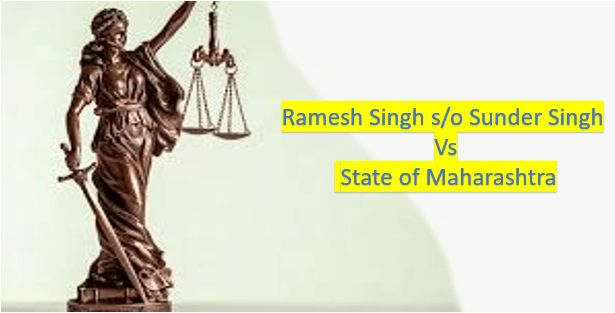
Case Name: Ramesh Singh s/o Sunder Singh …Vs State of Maharashtra.
Equivalent Citation: 13 April 1993 BomCR 138 CriLJ 2743.
Date of judgement: 13April 1993
Court: Bombay High Court
Petitioner: Ramesh Singh s/o Sunder Singh.
Respondent: State of Maharashtra.
Bench: B Wahane, W Sambre
Fact Of the case: In 1981, Cinema Film Distributors of Amravati reported to the police that unauthorized persons were dealing in film distribution without proper licensing or rights, including procuring films through theft. The police officer, Shri Shukla, searched a room used by the accused for film reel storage okk seized reels for the movie “Kurbani,” as well as 409 other reels, film boxes, and empty tin canisters. The police believed that these items were stolen property. The police then visited the accused’s residential house and seized more film reels, film cans, and cinema posters worth about Rs. 7,21,475/-, suspecting that they were stolen and that the accused was involved in the business of selling stolen film reels. The accused was subsequently arrested.
Issue Raised: The issue in this case is whether a conviction can be awarded without framing a charge under section 124 of the Bombay Police Act, even if it is a minor offence, considering the ingredients of the major offence of which the charge was framed against the accused.
Contention of the petitioner: The prosecution’s case against the appellant/accused is that they were involved in the illegal distribution of films without the necessary license or right of distribution. The police officer found film reels of a cinema movie titled ‘Kurbani’ and other films reels, film boxes, empty tin canisters, etc. in the accused’s room, which were believed to be stolen property. During the search of the accused’s residential house, several film reels, film cans, and cinema posters were seized, and the accused was arrested on suspicion of being involved in the business of stolen film reels.
The learned counsel for the accused argued that as the charge was not framed under section 124 of the Bombay Police Act, no conviction can be awarded without framing the charge, considering it as a special enactment. However, the prosecution has not been able to point out any provision under the Criminal Procedure Code or any special enactment that prohibits conviction without framing the charge, even if it is a minor offense, considering the ingredients of the major offense for which the charge was framed against the accused.
Contention of the Respondent: The respondent’s contention is that the absence of a charge under section 124 of the Bombay Police Act does not preclude conviction, as there is no bar under the Criminal Procedure Code or any special enactment that prevents a conviction without a charge, especially when the ingredients of the major offense are present. The respondent argues that the appellant/accused was charged with theft and dishonestly receiving stolen property, which are serious offenses, and the absence of a charge under section 124 of the Bombay Police Act does not affect the validity of the conviction. The respondent maintains that the seizure of the film reels, film cans, and cinema posters from the accused’s residence
supports the inference that the accused was involved in the business of stolen film reels, and there is sufficient evidence to support the conviction.
Judgement: The appellant/accused is challenging the conviction under section 124 of the Bombay Police Act, and the case has been placed before a Division Bench due to the challenge to the vires of the Act. However, the appellant’s counsel restricted their arguments to two grounds. Firstly, there was no charge framed under Section 124 of the Bombay Police Act, and the appellant was only tried for the offense of habitually dealing in stolen property under the Indian Penal Code and the Copy Right Act, of which he was acquitted. Therefore, the conviction under the special statute is not valid. Secondly, considering the long period of more than 11 years that has passed since the incident, the appellant’s counsel is requesting leniency and for the appellant to be released on a fine only, either maintaining the same or increasing the amount.
Conclusion: The appellant/accused is appealing the conviction under section 124 of the Bombay Police Act. The counsel argued that no charge was framed under section 124, and since the accused was acquitted of the other charges, he should not have been convicted under the special statute. The council also requested leniency due to the long period of 11 years for the case to ripe. The prosecution case against the accused involves the seizure of film reels and other material connected to the business of distribution, suspected to be stolen. The accused was arrested and his residential house was searched. The police seized several film reels, film cans, and cinema posters, and the accused was suspected of dealing in stolen film reels.
written by Bhupendra Kumar intern under legal vidhiya




1 Comment
Ajay Kumar · May 12, 2023 at 3:28 pm
👍